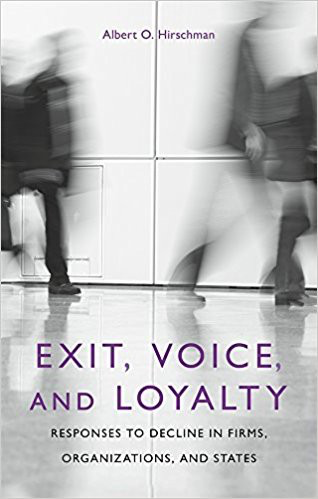Book Review: Exit, Voice and Loyalty
Exit is an important part of capitalism: by allowing consumers to take their money anywhere they please, it trims out inefficient firms, drives productivity and quality up, and prices down.

“One thing people underestimate is how markets don’t allow anyone to do anything except make better and better products.”
– Bill Gates
“If we don’t produce better shoes, faster, and at a lower price than Bob just next door, consumers will flock to him and we’ll be bankrupt before we know it!”
The mechanism is so crisp, so simple, and yet so powerful, that it’s one of the first ones most people, including billionaires and economists, resort to when thinking about markets.
But Hirschman makes the case that exit doesn’t have the monopoly over quality-improving, price-reducing forces, and proposes an alternative: voice. The reasoning goes as follows: even if I have a monopoly, if I keep producing goods or services of low quality, or at too-high a price, my customers will keep complaining about it, which can have unpleasant outcomes, such as attracting the attention of the regulator. Voice is a lot more messy than exit, but it works – in fact, it works because of its messiness.

The rest of the book is about the interplay between those two forces, voice and exit. In most cases, exit gives strength to voice: nobody cares about your complains if you have no better alternative. But in other cases, exit can downright be counter-productive, i.e. hurting quality and driving prices up. Those are the cases where firms or institutions are insulated from the signals exit send them, most of the time because they’re public entities, and so just don’t care much about profits.
The problem (and this is one of the most powerful points made by the book): in those instances, exit can provide an escape hatch to the most demanding customers, who then don’t make their voices heard by the firm, where voice is precisely the only thing that could get it to change. Those entities, for this reason, could even want the exit of those most demanding customers, who, if they stayed, would be nothing but pains in the ass. In the case of private firms, the existence of alternatives not only helps their case in anti-trust lawsuits (“we’re not a monopoly! look at those little guys in the corner who kinda compete with us if you think about our market in this arbitrary way”), it also drives the most demanding – and so potentially most vocal – customers away, leaving them with a bunch of docile customers who care a lot less.
But sometimes, the customers who remain don’t do so just because they’re docile, or non-demanding, but because they just can’t afford the higher quality, more expensive alternative. In this case, voice becomes the last resort of the powerless, and it can, when they organize themselves on a sufficient scale, actually be quite powerful.
Hirschman gives the example of public and private schools: if a public, free school decreases in quality, the most quality-conscious (or least price-conscious) parents will be the first ones to exit. This would result in a lower income for public schools, who would give a damn if they were, well, private. But since they’re funded by the state, mostly regardless of their financial performance, they don’t care about running at a loss – in fact, maybe they prefer it this way, so they can present themselves as the “steward of the poor, last bastion of the powerless” etc etc.
But what they do care about, since this deep-pocketed funder of theirs is subject to democratic forces, is the discontent of its customers. If a bunch of angry parents were to go in the streets tomorrow, chanting slogans about how public schools were but of bunch of stupid, corrupt incompetents, that would attract attention, and they might lose some funding or, more likely, be put under more stringent supervision. Hence, exit, by first trimming down the people who care the most, at the expense of their voice, actually contributes to the public school’s worsening quality.
This also means that there is something qualitatively different about the higher-quality, higher-price option in a market, which will gather the voices of the most demanding customers, serving as fuel in its quality-improving engine. Perhaps this is the reason why we hear so many people complain about problems with their iPhone, and so few with their Android, despite iOS being so obviously superior to it *ducks for cover*
An interesting application of Hirschman’s theory is how it applies to politics. If the market’s got exit, politics has votes, and, to a large extent, voice competes with votes just as much as it does with exit: if a voter isn’t happy with their party, they can either cry about it and try to “change it from the inside”, or give their vote to somebody else.
And, in the same way that, in the markets, voice will be the last resort of the captive customer, it is too the one of the captive voter. Now, since votes don’t cost anything, and everybody, rich and poor, get exactly one of them, who are those “captive voters”?
Think of political offerings as a one-dimensional spectrum, with everybody equally distributed along it, from left to right, depending on their opinion. Political parties need to get as many votes as possible to get elected, and people just vote for whatever party sits closer to them on the spectrum. In that case, political parties will try moving as close to the center of the spectrum as possible, which will make them capture more of those middle-votes. That also means they’ll drift further from their most extreme constituents, but nobody cares, since they’re still closest to them and so will still get their votes.
And this, according to Hirschman, is the reason why the most extreme voters are the most vocal: not just because they’re pissed off and there is something soothing in having everybody hear about it (although I’m sure there’s some of that too), but because they’re the ones least empowered by the democratic system, and since their vote isn’t going to get them anywhere, they’re left with nothing but their voice.
Now, like firms, political parties are both vote-maximizers, and, to a lesser extent, discontent-minimizers. Sometimes, they’ll overshoot in the latter direction (listening too closely to the extremists), at the expense of their votes-gathering.
(I usually try to read as little about politics as I can, since so much of it is pure signaling. For that reason, I’ll let people who are more knowledgable than me in this topic expand on how this applies to the last US elections, and more specifically the Hillary-supporters-Bernie-bros interplay, which I know next to nothing about.)
Now, loyalty. By delaying exit, loyalty tips the scale towards voice. Loyalists will tend to exit less, and complain more, than non-loyalists. Even if they exist, they will do it for radically different reasons than other people: when non loyalists exit, they then “couldn’t care less” about the fate of the firm they left behind. On the contrary, loyalists often resort to exit as another form of voice, and, in the case of the boycott, even make it explicitly contingent upon some action taken by the firm.
In that case, it could be argued that the person wasn’t loyal to the firm in the first place, but rather to some ideal it perceived the firm to stand for. This to me highlights the power of the narrative, that can become a self-fulfilling prophecy: by taking a public commitment to some mission of social value, a firm will attract those believing the most in it, who, through their voice, will hold the entity accountable to this ideal. This made me think of Muhtar Kent’s “A brand is a promise. A good brand is a promise kept.”
By and large, I don’t think I agree with Hirschman’s main point, i.e. that voice can be a substitute to exit, and that exit can sometimes even hurt quality and prices by muting out voice. Sure, you may be able to find some situations where, on the margin, that is the case, but I find them more interesting as counter-intuitive edge cases than as sizable phenomenons in the world. You can find those edge cases if you look hard, but the vast majority of the time, preventing exit is a net-negative, even accounting for the voice that comes to replace it.
The fact that exit could hold certain firms back says nothing about the counterfactual, which is the improvement in quality that would happen in the firm customers would be leaving for, and that is incentivized to fill up the gap left by the incumbent, to get those dissatisfied exiters’ money. Maybe Western Europe would have slightly improved, had people stayed put instead of leaving to America in the 18th and 19th centuries, but that doesn’t mean it was worth missing out on the opportunities offered by the new continent.

Even if voice was more effective, I wonder about its negative externalities. Voice implies flooding the meme space with messages of dissatisfaction, spreading them everywhere, including to people who aren’t the least concerned about the matter. Who would want to live in that negative cacophony? Exit, by comparison, is a lot quieter, cheaper and doesn’t even require people to be literate or articulate enough to voice their concerns. All it requires is for them to put the detergent bottle back onto the shelf, and pick another one instead.
You could also argue voice to be a zero-sum game, to the extent that influencing public opinion is the very way it gains its power, and that there are only so many messages large groups of people can be exposed to in a given day. Exit doesn’t know those limits on its bandwidth, and so scales much better.
Another power of exit, especially when it comes to community, is the ability to strengthen both sides: the deserted and the new group. Two factions stuck together in the same group will be doomed to pull in reverse directions, each canceling the efforts of the other in a tug-of-war that yields nothing but immobility (ohai congress). Decoupling them can allow each to evolve in the direction it would prefer, and so to increase their coverage area, and speed of exploration, of the tree of possibles. Many people describe this as one of the greatest forces of cryptoassets: like Chris Burniske said, Bitcoin’s forks have made it transition from 2 warring parties in a single country, to 2 different countries with a single party each.
2/ When #Bitcoin forked into $BTC & $BCH, governance went from 2 warring parties in 1 community, to 2 communities with ~1 party each
— Chris Burniske (@cburniske)
(Imagine how great Twitter would be if, instead of being stuck in intestine wars, which I assume is the reason why its product is at a standstill, true believers could get their “Twitter classic” that’s stuck in v0.1, with 140 characters, favorites still being favorites instead of likes, chronological timelines, etc… And the rest of us an actual modern product, with full algorithmical timelines, no character limit, and God knows what else innovative people could come up with if they didn’t have to spend their time arguing.)
Finally, even assuming that voice could bring improvements to existing firms, exit works in a radically different way: instead of trying to improve unsatisfactory, inefficient firms, it kills them, until only satisfactory ones remain. If voice is like a single firm doing dead-lifting, exit is like an entire ecosystem being subject to natural selection. And, no matters how much crossfit a fish does, it’ll just never be as good as lizards when it comes to crawling on rocks – if rocks-crawling is the last trend.
For that reason, I think exit is one of the greatest forces for good, and creating new escape doors is one of the highest leverage activities one can engage in. That’s one of the reasons why I’m so excited about blockchains: they break up monopolies, and create a new permissionless paradigm for innovation. Likewise, VR can break monopolies over space, by creating an infinite amount of it, allowing more experimentation, and models we can’t even think of today.
Flo Crivello Newsletter
Join the newsletter to receive the latest updates in your inbox.
